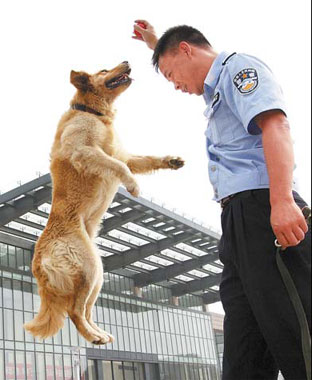Hurley, a 5-and-a-half-year-old German shepherd, heard the command "seek" and promptly yanked his police handler toward the small car parked in front of him.
With his tail up, the eager hound stuck his nose into everything inside the car, sniffing for all he was worth. When he found something suspicious, he stopped and sat perfectly still, just as he has been trained to do.
In the trunk of the car, Hurley's handler found a "bomb".
The device in this case was just a dummy, a training aid that was put in the trunk to test the dog's ability to sniff out explosives.

A police officer works with his dog at the Beijing People's Police College yesterday. More than 200 handlers and their dogs have relocated to the capital from across the country to help with Olympic security. Wang Jin
But during the Olympics and Paralympics, Hurley and his 203 four-legged colleagues will be searching for the real thing at sports venues, hotels and hospitals.
Just like the world's top athletes, Hurley and his canine pals are currently going through their final training routines ahead of this summer's Games. Yesterday, at the Beijing People's Police College, they put on their first public show for the media.
As 204 German shepherds, Rottweilers, Labradors, golden retrievers and springer spaniels paraded onto the training ground, reporters could have been forgiven for thinking they were at a dog show.
But these were no pampered pooches: They are the finest sniffer dogs from around the country, chosen for their outstanding performance in bomb detection, Ding Xingjian, deputy director of the criminal investigation department of the Beijing public security bureau, said.
"On average, they have been working as sniffer dogs for three to four years," he said.
"Several of them are worth 100,000 yuan ($14,600)."
The dogs and their handlers arrived in Beijing a month ago, to begin training and to allow the dogs time to get used to the local weather, Ding said.
Tang Shusheng, from the police dog training center in Kunming, Yunnan province, said real explosives, filled with a variety of materials such as gunpowder and Semtex, are being used to train the dogs.
At the start of their training, some of the dogs did not perform too well, Tang said.
Some of them scratched at the bombs when they found them - something that is strictly forbidden as it may cause an explosion - which was unusual, but we put it down to them being in a strange environment, he said.
"But after a month's training, they are all working superbly. In their last test, they all got straight As," he said.
Tang said all the dogs have been vaccinated against disease, and the facility has quarantine rooms for any that are suspected of being sick.
"Fortunately, though, none of them has been ill," he said.
An Ran, Hurley's handler, said that while all the selected dogs are impressive, there is no doubt which one is the best.
"My Hurley has been sniffing out explosives since he was 8 months old," he said.
"He's so good, he is always chosen to do the most important jobs whenever State leaders like President Hu Jintao and Premier Wen Jiabao visit my province."
The 30-year-old officer from Heilongjiang province, who recently got married, said Hurley is not just a colleague, he is more like a son.
"I've had him since he was just 3 months old, and I've spent every New Year's Eve with him since," An said.
Both he and his dog are sleeping and eating well in Beijing, he said.
"He has three two-hour classes every day, two in the morning and one in the evening," he said.
"He also has two meals a day, with a daily budget of 20 yuan. Usually, he gets only dog food."
At the end of the demonstration, An called, "Foot up!" and Hurley lifted his left paw, as if he was waving goodbye.
An then called, "Another!" and Hurley swiftly changed paws and "waved" with his right.
"See how clever and nice he is?" An said.
"But if I'm not with him, even my wife cannot touch him. Hurley will even refuse to eat if I am away from him for more than three days."
(China Daily July 3, 2008)